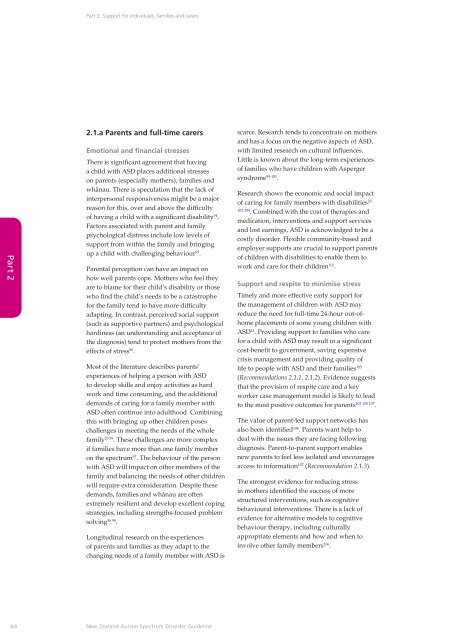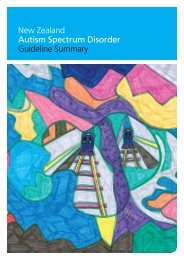New Zealand Autism Spectrum Disorder Guideline - Ministry of Health
New Zealand Autism Spectrum Disorder Guideline - Ministry of Health
New Zealand Autism Spectrum Disorder Guideline - Ministry of Health
You also want an ePaper? Increase the reach of your titles
YUMPU automatically turns print PDFs into web optimized ePapers that Google loves.
Part 2: Support for individuals, families and carers<br />
Part 2<br />
2.1.a Parents and full-time carers<br />
Emotional and financial stresses<br />
There is significant agreement that having<br />
a child with ASD places additional stresses<br />
on parents (especially mothers), families and<br />
whänau. There is speculation that the lack <strong>of</strong><br />
interpersonal responsiveness might be a major<br />
reason for this, over and above the difficulty<br />
<strong>of</strong> having a child with a significant disability 94 .<br />
Factors associated with parent and family<br />
psychological distress include low levels <strong>of</strong><br />
support from within the family and bringing<br />
up a child with challenging behaviour 95 .<br />
Parental perception can have an impact on<br />
how well parents cope. Mothers who feel they<br />
are to blame for their child’s disability or those<br />
who find the child’s needs to be a catastrophe<br />
for the family tend to have more difficulty<br />
adapting. In contrast, perceived social support<br />
(such as supportive partners) and psychological<br />
hardiness (an understanding and acceptance <strong>of</strong><br />
the diagnosis) tend to protect mothers from the<br />
effects <strong>of</strong> stress 96 .<br />
Most <strong>of</strong> the literature describes parents’<br />
experiences <strong>of</strong> helping a person with ASD<br />
to develop skills and enjoy activities as hard<br />
work and time consuming, and the additional<br />
demands <strong>of</strong> caring for a family member with<br />
ASD <strong>of</strong>ten continue into adulthood. Combining<br />
this with bringing up other children poses<br />
challenges in meeting the needs <strong>of</strong> the whole<br />
family 23 39 . These challenges are more complex<br />
if families have more than one family member<br />
on the spectrum 97 . The behaviour <strong>of</strong> the person<br />
with ASD will impact on other members <strong>of</strong> the<br />
family and balancing the needs <strong>of</strong> other children<br />
will require extra consideration. Despite these<br />
demands, families and whänau are <strong>of</strong>ten<br />
extremely resilient and develop excellent coping<br />
strategies, including strengths-focused problem<br />
solving 96 98 .<br />
Longitudinal research on the experiences<br />
<strong>of</strong> parents and families as they adapt to the<br />
changing needs <strong>of</strong> a family member with ASD is<br />
scarce. Research tends to concentrate on mothers<br />
and has a focus on the negative aspects <strong>of</strong> ASD,<br />
with limited research on cultural influences.<br />
Little is known about the long-term experiences<br />
<strong>of</strong> families who have children with Asperger<br />
syndrome 99-101 .<br />
Research shows the economic and social impact<br />
<strong>of</strong> caring for family members with disabilities 23<br />
102-104<br />
. Combined with the cost <strong>of</strong> therapies and<br />
medication, interventions and support services<br />
and lost earnings, ASD is acknowledged to be a<br />
costly disorder. Flexible community-based and<br />
employer supports are crucial to support parents<br />
<strong>of</strong> children with disabilities to enable them to<br />
work and care for their children 102 .<br />
Support and respite to minimise stress<br />
Timely and more effective early support for<br />
the management <strong>of</strong> children with ASD may<br />
reduce the need for full-time 24-hour out-<strong>of</strong>home<br />
placements <strong>of</strong> some young children with<br />
ASD 11 . Providing support to families who care<br />
for a child with ASD may result in a significant<br />
cost-benefit to government, saving expensive<br />
crisis management and providing quality <strong>of</strong><br />
life to people with ASD and their families 105<br />
(Recommendations 2.1.1, 2.1.2). Evidence suggests<br />
that the provision <strong>of</strong> respite care and a key<br />
worker case management model is likely to lead<br />
to the most positive outcomes for parents 103 105 107 .<br />
The value <strong>of</strong> parent-led support networks has<br />
also been identified 106 . Parents want help to<br />
deal with the issues they are facing following<br />
diagnosis. Parent-to-parent support enables<br />
new parents to feel less isolated and encourages<br />
access to information 107 (Recommendation 2.1.3).<br />
The strongest evidence for reducing stress<br />
in mothers identified the success <strong>of</strong> more<br />
structured interventions, such as cognitive<br />
behavioural interventions. There is a lack <strong>of</strong><br />
evidence for alternative models to cognitive<br />
behaviour therapy, including culturally<br />
appropriate elements and how and when to<br />
involve other family members 106 .<br />
64<br />
<strong>New</strong> <strong>Zealand</strong> <strong>Autism</strong> <strong>Spectrum</strong> <strong>Disorder</strong> <strong>Guideline</strong>











